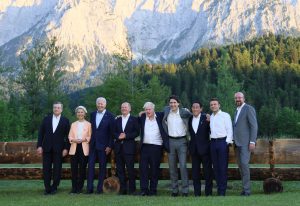The G-7 summit was held from June 26-28 in southern Germany, where discussions were dominated by the Russian invasion of Ukraine and the steep rise in global food and fuel prices.
With international media descending on the summit, Japan’s Prime Minister Kishida Fumio raised the issue of Japan’s worsening security environment in East Asia, referencing Russia and China’s “attempts to change the international order by force.” Kishida highlighted the need to maintain the rules-based global order, saying that “any attempt to change the status quo by force is unacceptable.” This was followed by appeals to a sense of shared crisis and unity, with the Japanese leader arguing that “the security of Europe and the Indo-Pacific are inseparable.”
Kishida hit back at China for its military and maritime expansion without naming the country explicitly, warning that countries should not draw the “wrong lessons” from the situation in Ukraine.
Japan also highlighted the issue of Chinese vessels intruding in waters surrounding the contested Senkaku Islands, which Japan administers but China claims as the Diaoyu Islands.
The G-7 leaders also exchanged views on North Korea’s accelerating missile development program. Kishida stressed the importance of “complete, verifiable and irreversible destruction of all weapons of mass destruction.” He called for greater action in order to prevent “North Korea believing that this is an opportunity to advance its nuclear and missile programs.”
At the G-7 summit the United States launched a framework for an infrastructure assistance program for developing countries in an effort to counter China’s Belt and Road Initiative, which the U.S. has accused of offering “unfair and opaque” loans to low and middle income countries. The new framework will be centered around raising some $600 billion over five years. Japan also offered to invest more than $65 billion over five years for sustainable infrastructure projects.
On Monday, China’s Foreign Ministry spokesperson said it welcomed any initiative aimed at global infrastructure development but was critical of any smear campaign against its Belt and Road Initiative under the pretext of infrastructure needs. The spokesperson denied the persistent allegations that their model locks borrowers in a cycle of massive loans, often called a “debt trap.”
As the ongoing war in Ukraine reached its fourth month, G-7 leaders discussed strengthening sanctions on Russia but there was also a sense of stalling progress. G-7 leaders expressed concern over sanctions and their effect on the global food crisis as well as how effective sanctions are in limiting Russia’s ability to finance the war.
For his part, Kishida stated his support for continuing sanctions and refuted Russia’s claims that sanctions are behind the soaring food and energy prices. “The G-7 must strengthen its unity to protect the lives of the people in each country from price hikes… We must also pay attention to sharp fluctuations in markets, including in exchange rates,” he told reporters at a press conference.
European Council President Charles Michel pointed out the secondary impacts of the sanctions stating, “We must be careful that sanctions against Russia do not hurt other countries or ourselves.” African nations have been hit hard by the disruption of grain in the wake of sanctions and Russia’s blockade of Ukrainian ports. Kishida announced that Japan will contribute $200 million in food aid to Africa and the Middle East that would be used to build storage facilities for wheat and other crops.
At the talks, Kishida positioned concerns over Russia and China as extending beyond economics. “The world is at a historical crossroads whether to defend or lose the peaceful international order,” he said.
Japan will host the next G-7 summit in Hiroshima in May 2023, with a message of peace and nuclear disarmament. It will be the first time leaders from nuclear powers Britain, France, and the U.S will together visit one of two Japanese cities struck by nuclear weapons during World War II.

































